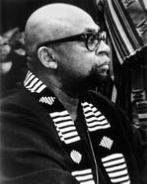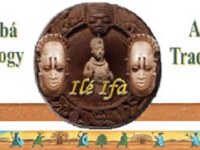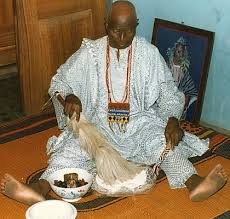Nowhere is the profundity and beauty of African spirituality more apparent than in the Odu Ifa, the sacred text of the spiritual and ethical tradition of Ifa, which is one of the greatest sacred texts of the world and a classic of African and world literature. Its central message revolves around the teach-ings of the Goodness of and in the world; the chosen status of humans in the world; the criteria of a good world; and the re-quirements for a good world. Although these themes are throughout the Odu Ifa, nowhere are they more explicit than in Odu 78:1. The Odu (chapter) begins by declaring “Let’s do things with joy…” For it is understood that the world was created in goodness and that we are to find good in the world, embrace it, increase it, and not let any good be lost. It is obvious here that all is not well with the world, given the poverty, oppression, exploi-tation and general suffering of people. But inherent in this firm belief in the good that is found in the Odu Ifa is the faith that in the midst of the worst of situations there are good people, good will and possibilities for creating good, increasing good and thus constantly expanding the realm of good.
The chosen status of humans is a sec-ond major tenet of Ifa. Odu 78:1 says we should do things with joy “for surely hu-mans have been divinely chosen (yan) to bring good into the world” and that this is the fundamental mission and meaning of human life. And we are chosen not over and against anyone, but chosen with everyone to bring good in the world. Thus, all of us are equally chosen. In fact, the word for human being is eniyan which literally means chosen one, and we are divinely chosen without dis-tinction of nation, race, gender, special reli-gious relationship or promise. Surely this poses an ideal many other world religions are still striving to establish as a central moral doctrine.
But even as we’re chosen, we must also choose to be chosen by doing good in the world. Thus, Odu 78:1 also says that no one can reach their highest level of spiritual-ity or rest in heaven until we all achieve the good world “that Olodumare, God, has or-dained for every human being.” This estab-lishes a divinely ordained right to a good life for every human being. But joined to this human right is the obligation of shared re-sponsibility of humans to make the world good so that everyone can enjoy a good life. The important contribution this makes here to theological and social ethics is that it teaches that transcendence in the spiritual and social sense can never be individualistic, but must always include the happiness and well-being of others. The Odu Ifa says all deserve a good life and good world; ultimate transcendence is impossible without it, and it is a shared task of all humans to achieve it.
The question is, then, posed to the sage and master teacher, Orunmila, of what is a good life and the conditions for the good world. Orunmila answers by saying that the achieving of a good life or good world is de-fined by several essential things: full knowl-edge of things; happiness everywhere; free-dom from anxiety and fear of hostile others; the end of antagonism with other beings on earth, i.e., animals, reptiles and the like; well-being and the end of forces that threaten it; and finally, freedom from pov-erty and misery. Now, it is of great signifi-cance that the first criteria for good life and good world is knowledge. In fact, Orunmila also says that knowledge or rather wisdom is the first requirement for achieving the good. This points to knowledge or education as a basic human right, necessary not only for our understanding our humanity in its most expansive forms, but also to realize it in the most meaningful and flourishing ways.
But again the good world will not come into being by itself. Thus, five re-quirements are necessary to bring it into be-ing. The first requirement Orunmila lists for achieving a good world, as noted above is wisdom. The text says we must develop “wisdom adequate to govern the world.” This reaffirms human responsibility for the world and the need to obtain adequate wis-dom to carry out this responsibility effec-tively. The core wisdom here is of necessity moral and spiritual wisdom which conceives the world in its interrelated wholeness, re-spects its integrity and works constantly to save, renew and expand the good in it.
Orunmila also taught that humans must move beyond moralities of convenience to a morality of sacrifice, i.e., self-giving in a real, meaningful and sustained way. The Odu Ifa says that “one who makes a small sacrifice will have a small result” (Odu, 45:1). It says to us “be able to suffer without surrendering and persevere in what you do” (Odu, 150). Also, a central moral quest in the Ifa spiritual and ethical tradition is to achieve iwapele, a gentle character or iwarere, good character which are often in-terchangeable. Orunmila cites this as the third requirement to achieving a good world. “It is gentle character which enables the rope of life to remain strong in our hands” according to Odu 119:1.
Orunmila teaches that another one of the main requirements for achieving the good world is “the love of doing good for all people, especially for those who are in need and those who seek assistance from us.” This requirement seeks to create a moral community based not on cold calculation of rule and duty, but on the love of doing good and the joy and benefit it brings to the doer and the recipient of the good. Odu 141:1 says, “Ofun is giving out goodness every-where. (But) Ofun does not make noise about it.” Indeed, to do things coldly and/or loudly is to diminish the good done.
The last requirement Orunmila cites as a requirement for creating a good world re-turns us to the fundamental meaning and mission in human life. He says what is re-quired is “the eagerness and struggle to in-crease good in the world and not let any good be lost.” Again, Orunmila calls for a profound commitment to the good world, and an ongoing and intense struggle for it until it is achieved. The Odu suggests that we must stay ever-ready and engaged, for it says in the pursuit of good, “a constant sol-dier is never unready even once” (Odu, 159:1).
The author

http://www.us-organization.org/position/documents/EthicalInsightsfromOduIfa.pdf
By Dr. Maulana Karenga, Professor of Black Studies, California State University-Long Beach, Chair of The Organiza-tion Us, Creator of Kwanzaa, and author of Kwanzaa: A Celebration of Family, Community and Culture, [www.Us-Organization.org and www.OfficialKwanzaaWebsite.org].

